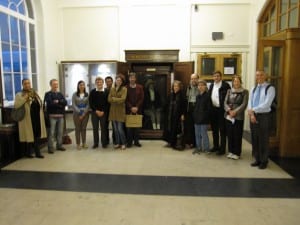
We are delighted to announce that Transcribe Bentham has been honoured with an Award of Distinction in the Digital Communities category of the highly prestigious Prix Ars Electronica. In each of its seven categories, the Prix juries award one overall Golden Nica, two Awards of Distinction, and twelve Honorary Mentions.
Part of the annual Ars Electronica festival, the Prix is the world’s foremost digital arts competition and has recognised many superb projects since it began in 1987. Former winners include Peter Gabriel, Tim Berners-Lee, Aphex Twin, and the animation team responsible for the dinosaurs of Jurassic Park. The Digital Communities section was won in 2004 by Wikipedia, and in 2009 Wikileaks was the recipient of the same Award of Distinction now bestowed upon Transcribe Bentham.
Needless to say, all involved in Transcribe Bentham were thrilled to receive this news and it has been a challenge to keep it under our hats until now, after the competition winners have been announced to the press. We would like to put on record our gratitude to the Prix Ars Electronica organisers and jury members for this award, which also carries a cash prize of €5,000. The money will be used to digitise and make available the rest of the manuscripts relating to Bentham’s Panopticon prison scheme. You can also read Jeremy’s reaction to the news here.
We consider this award an endorsement of the work of the project team in making available Bentham’s manuscripts for anyone, anywhere in the world to transcribe. We hope that we have helped to publicise the discipline of palaeography, the burgeoning collaborative manuscript transcription community, and generate interest in Bentham and his time by putting together a project in which academics and volunteers collaborate to both produce humanities research, and ensure the long-term preservation of UCL’s Bentham Papers collection.
Transcribe Bentham would not exist without the highly talented people comprising the project team. Hearty thanks are due to Professor Philip Schofield, Dr Valerie Wallace, Dr Justin Tonra, and Dr Tim Causer of the Bentham Project (past and present); Richard Davis and his team of fiendishly clever programmers at the University of London Computer Centre, who are responsible for crafting the Transcription Desk; Tony Slade at UCL Design, Photography and Web Services for the painstaking task of producing high-quality images of the manuscripts; Martin Moyle of UCL Library Services for hosting the Bentham digital repository; and Dr Melissa Terras and Dr Claire Warwick of UCL’s Centre for Digital Humanities for invaluable advice and support.
(We would also like to thank our parents, siblings, agents and pets, but won’t for fear of turning this into a tear-flecked Oscars-style meltdown).
Just as importantly, the award is testament to the hard work and efforts of all those volunteers who have contributed to the success of the project during the last nine months. They have produced well over 1,300 transcripts, of which more than 80% are complete. This award is as much in their honour as ours, and we hope that the resulting publicity will assist in recruiting more volunteers to the cause.
This year’s Ars Electronica Festival takes place from 1 to 6 September in the Austrian town of Linz, with its theme being ‘Origin’, and is being run in co-operation with the European Organisation for Nuclear Research (CERN) and with a particular focus upon its ground-breaking research. All of this year’s award winning entries will be on display for the public to see, discover, and explore at the Offenes Kulturhaus in Linz from 1 September.
Dr Tim Causer will travel to Linz to attend the Ars Electronica Gala to receive the prize at the award ceremony on behalf of the project team and its volunteers, and the Ars Electronica Forum where winning projects will be presented and discussed to festival attendees and the press.
We will update this blog in the coming days as more news and information, such as the jury citation, comes in. UCL’s Media Relations team have also issued a press release regarding the news, which can be found here. In the meantime, we hope you are just as thrilled as us about the news!
Update, 2 June 2011: Here is the Ars Electronica press release with a full list of Golden Nica and Awards of Distinction winners, and those who received an honorary mention. Congratulations to our fellow Digital Communities Award of Distinction winner X_MSG, which is pioneering and inexpensive method of communication which aims to promote education and cooperation among sex workers and activists. Also a huge well-done to the category and Golden Nica winner Fundación Ciudadano Inteligente (Smart Citizen Foundation), a non-profit organisation which promotes transparency and accountability in South American politics, an endeavour of which Bentham would have greatly approved. Transcribe Bentham is in good company!

 Close
Close


